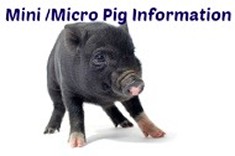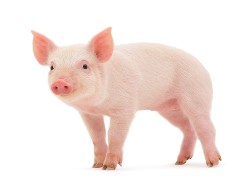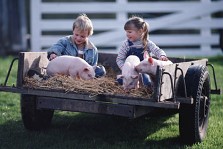|
|
|
|
wsp_rte_replace_marker?

|
Micro and mini pigs are very intelligent animals. They tend to get along with other pets are are good with children. Diet - Pigs are prone to over eat and gain too much weight. Overweight pigs have big swaying bellies, which lead to spinal concerns. To prevent that, you can feed your pig commercial pig pellets as the main diet. Pigs love vegetables as treats, not as their main diet! Your pig should have fresh filtered or bottled water available at all times.
House Training - You might want a piggy area for your pig when you can't watch it. Make sure your pig is supervised if you do let him out of the piggy area. Your piggy area should be free of any small toys or any electrical cords. If you want to potty-train your pig, get a litterbox! Try to use safe pelleted litter like Feline Pine or Yesterday's News. If you don't want pig waste in your house, then you can potty-train it outside. Bathing and Grooming - Pigs need their hooves trimmed a few times a year. They like staying clean, so when you wash them, use a gentle, fragrance free shampoo. But, make sure you don't overbathe them, as they have a tendency to get dry skin.
Socialization - It's very important to socialize your pig. You should get them used to being picked up and held. Veterinary Care - Your piggy should see the vet for a full physical test at least one time a year. There are several vaccines your pig will need. Your pig can get both internal and external parasites. Your pig should also be spayed/neutered by 3 months of age.
|



